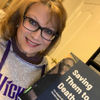Four Years and No Guarantees it Won't Happen Again Except in One State: Texas. But Maybe We Can Change That Soon!
- Mary Nichols

- Mar 14, 2024
- 3 min read

Long-term care residents lived and died in isolation and suffered indescribable and unnecessary cruelty for the crime of requiring 24/7 skilled nursing to survive. They said video goodbyes, if there was time, and people with intellectual disorders and dementia couldn't cope with plexiglass booths, six-foot separated no-touching visits, or waving from second story windows. Families were criticized for not just "taking them home" which was certain death for people like my mother who were wholly incapacitated.
Despondency, extreme weight loss, rapid cognitive decline, and acceleration of disease were all attributed to "failure to thrive" until we knew that it was not. By then, it was too late. Residents were already dying, many no longer recognized friends and family, and others were in such states of hysteria at their inability to understand virtual visits, plexiglass booths or why family couldn't come through closed windows and doors that facilities routinely began forbidding visits at all.
People without loved ones in long-term care think it was just about not receiving visitors. Nope. Residents ate cold food in their rooms and spoke to nobody except staff. Many rooms went uncleaned and residents never went outdoors. Their personal property was confiscated and often never returned. They lost the use their own doctors, couldn't leave the facility for dental, oncology, gynocological, or other critical medical visits, couldn't wear their own clothes, were denied mail and deliveries, were not allowed to vote, denied religious activities and use prayer mats and Bibles in their own rooms, were not allowed to receive phone calls, and denied care plan meetings and access to ombudsmen.
While many states have put "essential caregiver" and "no patient left alone" statutes in place, they vary, many are not much more than "end of life visits", and none preserve the resident's Federal right to 24/7 in-person access. All these bills are important and put laws in place to help prevent isolation but all can be paused by Section 1135 under section 1135 of the Social Security Act.
When a president declares a disaster or emergency under the Stafford Act or National Emergencies Act and the HHS Secretary declares a public health emergency under Section 319 of the Public Health Service Act, the Secretary of HHS is authorized to take certain actions in addition to regular authorities INCLUDING pausing all in-person visitation and other rights guaranteed in the 1987 Nursing Home reform Act. That is what happened in March of 2020.
ONLY TEXAS HAS MADE ACCESS TO AT LEAST ONE PERSON A CONSTITUTIONAL RIGHT FOR EVERY LONG-TERM CARE RESIDENT EVEN WHEN THAT HAPPENS.
We must never allow this to happen again. We need to make sure every long-term care resident in every state has at least a PORTION of their Federal right to 24/7 in-person access preserved in every circumstance. How? Legislation that amends the law to require that even when there is a disaster or public health emergency or any other crisis, those "certain actions" the HHS secretary is authorized to take must preserve the right for every resident to receive in-person access by at least one person, an "essential caregiver", "essential support person" or whatever we call them, so that no resident is wholly isolated, left without an advocate, and missing extra eyes necessary to protect their rights, make sure they are getting proper care, and prevent the potential for abuse and neglect.
Texas Caregivers for Compromise has been working with colleague advocates and legislators on just such a bill for over three years and unlike HR3733 we worked on last session, this bill will be truly bicameral and bipartisan and has been workshopped by many many stakeholders. We are hopeful that before much longer, it will become a reality and we may actually see it introduced to Congress.
We are Texas Caregivers for Compromise and we are #notgoingaway.



Comments